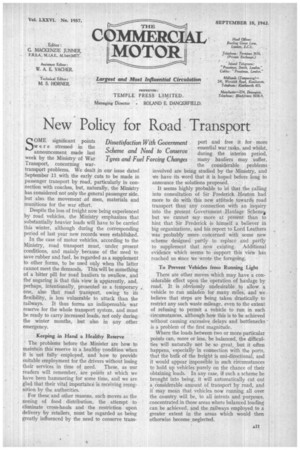New Policy for Road Transport
Page 13

If you've noticed an error in this article please click here to report it so we can fix it.
SOME significant points we r e stressed in the announcement made last week by the Ministry of War Transport, concerning wartransport problems. We dealt in our issue dated September 11 with the early cuts to be made in passenger transport by road, particularly in connection with coaches, but, naturally, the Ministry has considered not only the general passenger side, but also the movement of men, materials and munitions for the war effort.
Despite the loss of freight now being experienced by road vehicles, the Ministry emphasizes that substantially heavier loads will have to be carried this winter, although during the corresponding period of last year new records were established.
In the case of motor vehicles, according to the Ministry, road transport must, under present conditions, and mainly because of the need to save rubber and fuel, be regarded as a supplement to other -forms, to be used only when the latter cannot meet the demands. This will be something of a bitter pill for road hauliers to swallow, and the sugaring is that this view is apparently, and, perhaps, intentionally, presented as a temporary one, also that road transport, owing to its flexibility, is less vulnerable to attack than the railways. It thus forms an indispensable war reserve for the whole transport system, and must be ready to carry increased loads, not only during the winter months, but also in any other emergency.
Keeping in Hand a Healthy Reserve • The problems before the Minister are how to maintain this reserve in a healthy condition when it is not fully employed, and how, to provide suitable employment for the drivers without losing their services in time of need. These, as our readers will remember, are points at which we have been hammering for some time, and we are glad that their vital importance is receiving recognition by the authorities.
For these and other reasons, such moves as the zoning of food distribution, the attempt to eliminate cross-hauls and the restriction upon delivery by retailers, must be regarded as being greatly influenced by the need to conserve trans port and free it for more essential war taslgs, and whilst, during the interim period, many hauliers may suffer, the considerable problems involved are being studied by the Ministry, and we have its word that it is hoped before long to announce the solutions proposed.
It seems highly probable to ig that the calling into consultation of Sir Frederick Heaton had more to do with this new attitude towards road transport than any connection with an inquiry into the present Government Haulage Scheme. but we cannot say more at present than to hint that Sir Frederick is himself a believer in big organizations, and his report to Lord Leathers was probably more. concerned with some new scheme designed partly to replace and partly to supPlement that now existing. Additional evidence which seems to support this view has reached us since we wrote the foregoing.
To Prevent Vehicles from Running Light There are other moves which may have a considerable effect upon the operation of haulage by road. It is obviously undesirable to allow a, vehicle to run unladen for many miles, and we believe that steps are being taken drastically to restrict any such waste mileage, even to the extent of refusing to permit a vehicle to run in such circumstances, although how this is to be achieved without causing excessive delays and bottlenecks is a problem of the first magnitude.
Where the loads between two or more particular points can, more or less, be balanced, the difficulties will naturally not be so great, but it often happens, especially in connection with the ports, that the bulk of the freight is uni-directional, and it would appear impossible in such circumstances to hold up vehicles purely on the chance of their obtaining loads. In any case, if such a scheme be brought into being, it will automatically cut out a Considerable amount of transport by road, and if may mean that vehicles now running all over the country will be, to all intents and purposes, concentrated in those areas where balanced loading can be achieved, and the railways employed to a greater extent in the areas which would then otherwise become .neglected.




















































